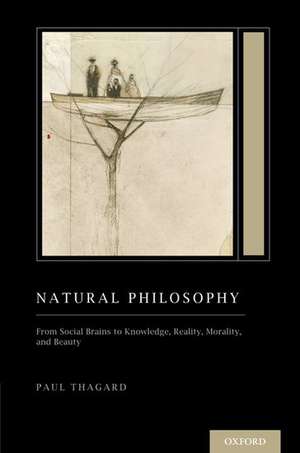Natural Philosophy: From Social Brains to Knowledge, Reality, Morality, and Beauty (Treatise on Mind and Society): Oxford Series on Cognitive Models and Architectures
Autor Paul Thagarden Limba Engleză Paperback – 5 ian 2022
| Toate formatele și edițiile | Preț | Express |
|---|---|---|
| Paperback (1) | 321.74 lei 3-5 săpt. | |
| Oxford University Press – 5 ian 2022 | 321.74 lei 3-5 săpt. | |
| Hardback (1) | 331.89 lei 31-38 zile | |
| Oxford University Press – 21 mar 2019 | 331.89 lei 31-38 zile |
Preț: 321.74 lei
Nou
Puncte Express: 483
Preț estimativ în valută:
61.56€ • 64.28$ • 50.95£
61.56€ • 64.28$ • 50.95£
Carte disponibilă
Livrare economică 14-28 martie
Preluare comenzi: 021 569.72.76
Specificații
ISBN-13: 9780197619681
ISBN-10: 0197619681
Pagini: 360
Dimensiuni: 156 x 236 x 21 mm
Greutate: 0.52 kg
Editura: Oxford University Press
Colecția OUP USA
Seria Oxford Series on Cognitive Models and Architectures
Locul publicării:New York, United States
ISBN-10: 0197619681
Pagini: 360
Dimensiuni: 156 x 236 x 21 mm
Greutate: 0.52 kg
Editura: Oxford University Press
Colecția OUP USA
Seria Oxford Series on Cognitive Models and Architectures
Locul publicării:New York, United States
Recenzii
Thagard embraces what he calls the "three analysis" method-i.e., providing exemplars, typical features, and explanations. He applies this methodology extensively throughout the text to philosophical questions related to such topics as mind, knowledge, reality, morality, meaning, and beauty. Though this strategy "does not yield answers that reign with unchallengeable certainty," as Thagard writes in chapter 1, it does provide answers-or, better, hypotheses that are consistent with a metaphysics based in scientific realism and an epistemology based in reliable coherentism.
With the appearance of Natural Philosophy, Paul Thagard, one of the foremost proponents of philosophical naturalism in our time, establishes how the social, cognitive, and brain sciences, and Chris Eliasmith's Semantic Pointer Architecture, in particular, provide resources for a rigorous, scientifically-informed, and systematic approach to the entire range of classical philosophical problems. Thagard's Natural Philosophy is not a program of reduction but rather one of integration, which examines what are, in a scientific age, the inevitable interconnections and interdependence of these sciences and the perennial projects of philosophy - including metaphysics and mind, epistemology and ethics, and political philosophy and the philosophy of art.
With the characteristic clarity, economy, and insight that have distinguished all of his work for more than four decades, Thagard demonstrates the strengths of a naturalistic philosophical program that attends to the relevant sciences, compared to its classical and contemporary competitors."
Drawing on the many original positions he has developed throughout his distinguished career in philosophy and cognitive science, Paul Thagard provides a synoptic overview of natural philosophy in his flowing, easy to read style. He makes use of the now widely accepted view, that he helped to develop, of interactions between mechanisms at multiple levels - the molecular, neuronal, mental, and social. The work admirably shows that philosophy can be, as he puts it 'extraverted, directing its attention to real world problems.'"
Rather than focusing on providing the necessary and sufficient conditions for a concept or an event or on conscious experience and introspection, Thagard embraces what he calls the "three analysis" method
With the appearance of Natural Philosophy, Paul Thagard, one of the foremost proponents of philosophical naturalism in our time, establishes how the social, cognitive, and brain sciences, and Chris Eliasmith's Semantic Pointer Architecture, in particular, provide resources for a rigorous, scientifically-informed, and systematic approach to the entire range of classical philosophical problems. Thagard's Natural Philosophy is not a program of reduction but rather one of integration, which examines what are, in a scientific age, the inevitable interconnections and interdependence of these sciences and the perennial projects of philosophy - including metaphysics and mind, epistemology and ethics, and political philosophy and the philosophy of art.
With the characteristic clarity, economy, and insight that have distinguished all of his work for more than four decades, Thagard demonstrates the strengths of a naturalistic philosophical program that attends to the relevant sciences, compared to its classical and contemporary competitors."
Drawing on the many original positions he has developed throughout his distinguished career in philosophy and cognitive science, Paul Thagard provides a synoptic overview of natural philosophy in his flowing, easy to read style. He makes use of the now widely accepted view, that he helped to develop, of interactions between mechanisms at multiple levels - the molecular, neuronal, mental, and social. The work admirably shows that philosophy can be, as he puts it 'extraverted, directing its attention to real world problems.'"
Rather than focusing on providing the necessary and sufficient conditions for a concept or an event or on conscious experience and introspection, Thagard embraces what he calls the "three analysis" method
Notă biografică
Paul Thagard is a distinguished philosopher and cognitive scientist who has written many books, including The Brain and the Meaning of Life (Princeton University Press, 2010) and The Cognitive Science of Science (MIT Press, 2012). He is a Fellow of the Royal Society of Canada, the Cognitive Science Society, and the Association for Psychological Science.













